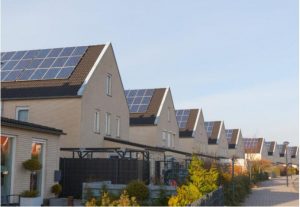
The Gulbarga Electricity Supply Company (GESCOM) has invited bids for the design, supply, installation, and commissioning of 10 MW of grid-connected rooftop solar systems under net metering on residential buildings in seven districts in Karnataka.
The contract will include the annual maintenance contract for five years under the ‘Soura Gruha Yojane’ program. The projects will be installed in Bidar, Kalaburagi, Yadgir, Raichur, Koppal, Ballari, and Vijayanagara districts.
The last date to submit the bids is April 12, 2021. Bids will be opened on April 15. The pre-bid meeting will take place on April 5.
The successful bidder should use only indigenously manufactured solar panels (both cells and modules manufactured in India) for the project.
Rooftop solar installations up to 3 kW will qualify for a subsidy of 40%. For rooftop installations above 3 kW and up to 10 kW will get a subsidy of 40% for the first 3 kW and 20% for the remaining capacity. For group housing societies and residential welfare associations, the central financial assistance (CFA) will be restricted to 20% for common facilities up to 500 kW.
If the discovered lowest price is higher than the benchmark cost set by the Ministry of New and Renewable Energy (MNRE) in each category, the benchmark cost will be treated as the lowest price. The rooftop solar systems’ benchmark costs range between ?47,000 ($646)/kW to ?36,000 ($495)/kW for system capacities of 1-500 kW.
GESCOM updated
The applications will be shortlisted on a first-come, first-serve basis for a capacity of 10 MW (7 MW for residential and 3 MW for group housing societies and residential welfare associations).
To participate in the bidding process, the lead bidder or its joint venture partner should be a system integrator or a module manufacturer, or both. The bidder should have executed projects with a minimum cumulative capacity of 80%, i.e., 400 kW, in the last three financial years. The bidder should have carried out the project for a distribution company (DISCOM), state or central government, public sector undertaking, or private sector.
Alternatively, the lead bidder registered under the micro, small, and medium enterprises (MSMEs), should have completed projects of a minimum cumulative capacity of 40% of the tendered capacity, i.e., 200 kW in the last two financial years.
The lead bidder’s average annual turnover should not be less than 100% of the amount put to tender during the last three financial years, which amounts to ?23.5 million (~$322,458). For MSMEs, the lead bidder’s average annual turnover should not be less than 50% of the amount put to tender, i.e., ?5.8 million (~$79,585) during the last two financial years.
Before the bid submission date, the bidder’s liquid assets should not be less than 25% of the amount put to tender. For MSMEs, the bidder’s liquid assets should not be less than ?2.9 million (~$39,792).
Previously, Mercom reported that GESCOM had floated five tenders for 2,990 kW of grid-connected rooftop solar power projects on government buildings.
In February this year, the Karnataka Electricity Regulatory Commission proposed allowing net metering for rooftop solar projects between 1 kW and 10 kW and gross metering for capacity over 10 kW. The Commission suggested generic tariffs of ?3.82 (~$0.0526)/kWh for residential rooftop solar systems between 1 kW and 10 kW, and ?2.84 (~$0.0391)/kWh for projects between 1 kW and 2 MW (large-scale).
Mercom’s flagship event Mercom India Solar Summit, to be held virtually on April 8 and 9, 2021, has an exclusive session to discuss “Can Rooftop Solar Come Out of Ground Mount’s Shadow and Be the Next Big Thing?” Industry stakeholders will share ideas on facilitating growth in the rooftop market and addressing challenges in dealing with DISCOMs. You can click here to register for the event.





